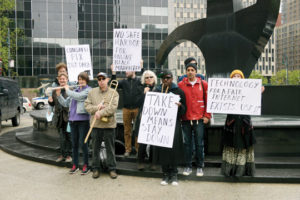by Marc Ribot, Member of Local 802’s Artist Rights Caucus

Local 802 (New York City) guitarist Marc Ribot is an active member of the local’s Artist Rights Caucus.
The Artist Rights Caucus of Local 802 (New York City) congratulates AFM President Ray Hair and the AFM’s negotiating team on the impressive gains won in the Sound Recording Labor Agreement (SRLA). We share President Hair’s hope that these gains reflect a beginning of the end of the disastrous period in which our industry “reel[ed] from the erosion of traditional business models … in the context of revenues that have declined by nearly two-thirds in the last two decades.”
As President Hair’s column “Streaming Funds Pension, Residuals in New Label Deal” (March 2017, IM) made clear, these gains reflect both the solidarity of our membership, and the tough, skilled negotiations of the AFM’s representatives. They also reflect growth in the industry as a whole.
However, if this progress is to be sustainable, working musicians can’t afford to be spectators in the fight against Silicon Valley’s attacks on our rights and livelihoods. We need to understand how the mass infringement of copyright by online services continues to limit and threaten growth in our industry, and we need to continue the fight against this and other Silicon Valley attacks.
We need to understand that the 57% gain in the streaming market does not represent a 57% gain in overall industry revenue. Actual industry growth in 2016 was somewhere between 3.2% and 8%, according to the IFPI Global Music Report 2016 (ifpi.org/news/IFPI-GLOBAL-MUSIC-REPORT-2016). Although streaming revenue growth rates are up, the rate per spin continues to fall. So as streaming cannibalizes sales, it not only fails to make up the revenue from sales, but as reported on the website Digital Music News (www.digitalmusicnews.com/2017/05/16/spotify-audiam-low-rates/), it makes up a shrinking share of overall revenue. Also, we need to understand recent growth in the context of overall industry losses of more than 60% since 1999, as reported in an April 2015 Music Business Worldwide article (www.musicbusinessworldwide.com/global-record-industry-income-drops-below-15bn-for-first-time-in-history/).

New York City rank-and-file group Musicians’ Action demonstrates for Artists Rights outside hearings
on section 512 of the Digital Millennium Copyright Act being held by the US Copyright Office in the Thurgood Marshall Courthouse in Manhattan.
For growth to be sustainable, and for it to come close to offsetting the revenue lost from the dramatic decline in CD sales and legal downloads, we need to end the mass infringement of copyright taking place on YouTube and pirate sites. Until the “safe harbors” that protect online corporations profiting from mass infringement are restricted, there is no way that the streaming market can ever hope to reach its potential. Indeed, it is highly questionable whether Spotify, which has yet to post a profit, and which may soon face major challenges from songwriters and publishers, can even survive.
Musicians and creators have a tremendous stake in ensuring that online services are viable for users, distributors, and creators. We can gladly support user access to music in many different formats—including streaming—so long as our copyrights are respected and we are adequately compensated. But we will never be adequately compensated through streaming services unless all services compete on a fair and equal footing.
Right now, this is not the case. Fully licensed and legal services like Spotify, Deezer, and Apple must compete against platforms that reap ad-based profit from mass infringement (e.g., YouTube) or provide access to pirate sites (e.g., torrent sites via Google search), while hiding behind the safe harbor clauses of the Digital Millennium Copyright Act (DMCA). This unfair competition prevents the development of a true market for online music, depresses licensing revenue, slows conversion to the paid (premium) tiers of streaming services, and ultimately, takes money out of the pockets of musicians and the companies that hire musicians.
In order to sustain the gains won in recent contract negotiations, the AFM must address these impediments. It can do so by focusing its political resources on the legislative goals outlined in the AFM and music community response to the US Copyright Offices (USCO) inquiry on Section 512 of the DMCA, mobilizing resources and membership in support of these goals, and urging the other unions and organizational signers of the music community USCO response to do the same.
The members of the Artist Rights Caucus of Local 802 understand that the futures of our livelihoods, industry, and art form are at stake. We believe that together, through our union, we can reinstate fair market conditions in our industry, and sustain the progress made in this contract into the next one and beyond. Questions or feedback for the Artist Rights Caucus can be sent to: artistrightscaucus@gmail.com.

